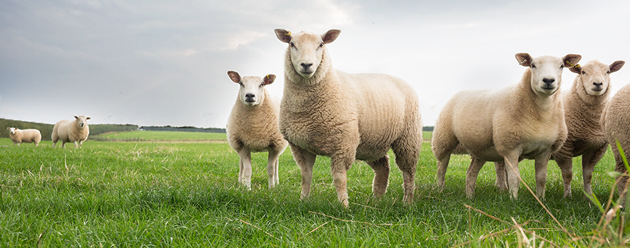
A Closer Look At The Sheep And Goats We Help Care For
October 11, 2016
Raising and caring for sheep and goats requires a variety of health management approaches that support wellness and maximize the potential of the flock and herd.
This sixth article in our series about the animals we help care for focuses on sheep and goats. Raising and caring for these animals requires a variety of health management approaches that support wellness and maximize the potential of the flock and herd. In addition to providing anti-parasitic treatments, vaccines and other therapies to boost the health of sheep and goats, Zoetis offers technology and support programs that help farmers – even in the most remote locations – better care for their animals.
The complexities of farming
Sheep and goats are important to our global economy as a source of meat, milk, and fiber. Because they can graze on rocky and steep terrain that may not be useful for other types of farming they are, compared with other farm animals, relatively inexpensive to raise. But for the same reason, and because they are raised all over the globe, there are many variations in the ways in which they are cared for. While their most common health issue is parasites, the types of parasites vary by region. Internal parasites are an issue globally, while external parasites vary in importance by geography. For example, lice are a major focus in wool-producing markets like Australia but, in contrast, in damper climates like New Zealand and Europe producers are more concerned with flies, while in Africa and the Middle East, ticks, which can carry a variety of different diseases, are a bigger problem.
Zoetis offers a range of products for sheep and goats (also referred to as “small ruminants”), including anti-parasitic treatments, anti-infectives and vaccines. In some markets, we have products to aid in sheep breeding as well. You can find a partial list of these products here.
Supporting customer relationships
In addition to marketed products, Zoetis offers a range of support services to help veterinarians and farmers better care for sheep and goats. Among them are:
Parasite Watch: A free service for farmers in the United Kingdom, Parasite Watch comprises a network of farmers who share diagnostic results and other information about parasites that are prevalent in the region at different times. A team of veterinarians review the data, push out an online calendar of parasite prevalence, and share advice on providing appropriate treatment and control to protect the animals. Learn more about Parasite Watch here.
Necropsy Online Module: In rural areas of southern Europe, starting in Spain, we help veterinarians engage with sheep and goat producers using telemedicine. The vets take photographs of very sick or deceased animals out in the field and send them with other pertinent details to University-based experts, who provide diagnoses remotely.
Expert Parasite Diagnosis: In a program similar to the Necropsy Online Module, we work with Naples University in Italy to have farmers send sheep and goat stool samples to their labs for a diagnostic report. When the results are available, the local Zoetis team meets with the veterinarian and farmer to create and implement a treatment plan for the animals. Currently, we are developing similar relationships with labs in additional markets, and organizing local workshops to help veterinarians create farm level parasite control plans.
Abattoir Initiative: To support communication between sheep processors and producers in Australia, Zoetis has developed an education and awareness program featuring processor tours and education days associated with manageable and preventable diseases affecting carcass yield in an effort to increase sheep producer’s profitability. To date, more than 1000 farmers have participated representing more than 2.25 million breeding ewes.
Sharing Best Practices: We facilitated the visit of customers from key accounts in Portugal and Romania to some of the most productive farms in Israel. The farmers took back many techniques and processes they could adapt locally to improve the performance of their own farms.
Together, these programs have all helped strengthen partnerships between Zoetis, farmers and veterinarians, helping to improve the health of the small ruminant population.
Learn more
To learn more about the work we do to help support sheep and goat farmers, visit this link.